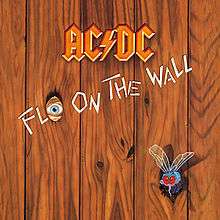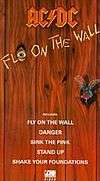Fly on the Wall (AC/DC album)
| Fly on the Wall | ||||
|---|---|---|---|---|
 | ||||
| Studio album by AC/DC | ||||
| Released | 28 June 1985 | |||
| Recorded | October 1984–February 1985, Mountain Studios, Montreux, Switzerland | |||
| Genre | Hard rock | |||
| Length | 40:30 | |||
| Label | Albert Productions, Atlantic Records | |||
| Producer | Angus Young and Malcolm Young | |||
| AC/DC chronology | ||||
| ||||
| Singles from Fly on the Wall | ||||
|
||||
| Professional ratings | |
|---|---|
| Review scores | |
| Source | Rating |
| Allmusic | |
| Rolling Stone | (unfavourable) link |
| The Rolling Stone Album Guide | |
Fly on the Wall is an album by Australian hard rock band AC/DC. It was the band's ninth internationally released studio album and the tenth to be released in Australia. All songs were written by Angus Young (guitar), Malcolm Young (guitar), and Brian Johnson (vocals). The album was re-released in 2003 as part of the AC/DC Remasters series.
Background
Although AC/DC's 1983 album Flick of the Switch had gotten mixed reviews from critics, the band remained one of the biggest hard rock acts in the world. In October 1984, Atlantic Records in the United States released the EP '74 Jailbreak, a collection of previously unheard studio tracks culled mainly from the band's 1975 Australian debut High Voltage, which was well received by fans. In January 1985, the band took three weeks off from recording what would become Fly on the Wall to headline two nights at the 10-day Rock In Rio festival in Rio De Janeiro, Brazil, appearing to over 250,000 people on 19 January with the Scorpions, Whitesnake, and Ozzy Osbourne.
Recording and release
The sessions for Fly on the Wall took place in Montreux, Switzerland at Mountain Studios in late October 1984. Originally released on 28 June 1985, it was AC/DC's first album since the original Australian version of High Voltage not to include drummer Phil Rudd, who was replaced by Simon Wright (although Wright appeared in music videos for Flick of the Switch tracks), making it the first AC/DC album with all band members born in the UK.[1] It was the second and last album to be produced by band members, but in contrast to their previous album, Flick of the Switch, which was produced by the band as a whole, Fly on the Wall was produced only by guitarists Angus and Malcolm Young, who hoped to capture the rawness and simplicity of their early works[2] in a time when pop-oriented glam metal became popular. In a 1985 interview with Sky Channel for the Monsters of Rock show, Brian Johnson explained, "In my experience, the lads went in with a producer, but they were still really telling the lad what they wanted, so in a round-about way all it is an extra pair of ears. An expensive extra pair of ears."
The album was not well received by critics and only sold one million copies upon its release, as opposed to the success of their previous albums, Back in Black and For Those About to Rock We Salute You.[3] The singles "Shake Your Foundations" and "Sink the Pink", however, are seen as standouts,[2][4][5] and both songs were later included on the band's soundtrack album Who Made Who for Stephen King's film Maximum Overdrive. However, the song "Danger" fell flat in concert and was banished from the set.[6] Some critics also complained that Johnson's vocals were difficult to decipher, and the band would indeed raise them in the mix for the Who Made Who soundtrack. A home video of AC/DC performing five songs from the album was released in the summer of 1985. The video, also titled Fly on the Wall, features the band playing the songs "Fly on the Wall", "Danger", "Sink the Pink", "Stand Up", and "Shake Your Foundations" at a small bar in New York City named The Crystal Ballroom. At the bar, a photographer attempts to sneak in to take photographs of the band, and as the band performs, new characters are introduced during each song, including three suit-clad men and two women during "Stand Up", and a lady dressed in all pink during "Sink the Pink". The cartoon fly depicted on the album cover is also seen in the video. If nothing else, the video demonstrated the band's new commitment to the now powerful MTV by going beyond performance based videos.

AC/DC's 1985 Fly on the Wall tour was marred by bad publicity when serial killer Richard Ramirez was arrested. Ramirez, who would be nicknamed the "Night Stalker" by the press, told police that the song "Night Prowler" from the band's 1979 Highway to Hell album had driven him to commit murder, and police also claimed that Ramirez was wearing an AC/DC shirt and left an AC/DC hat at one of the crime scenes. As Murray Engelheart observes in his book AC/DC: Maximum Rock & Roll, "It was just what the band's detractors had been waiting for and the media, especially in America, immediately seized on the case. Wild accusations that AC/DC were, in fact, devil worshippers were bandied about...The lyrics of 'Night Prowler' were carefully analysed and some newspapers attempted to link Ramirez's Satanism with AC/DC's name, somehow arriving at the conclusion that AC/DC actually stood for Anti-Christ, Devil's Child." The band maintained that the song had been given a murderous connotation by Ramírez, but is actually about a boy sneaking into his girlfriend's bedroom at night while her parents are asleep.[7] In an 2000 interview for the MuchMoreMusic documentary The Story of AC/DC Angus wryly states, "I can't remember the last black mass I attended."
Reception
In the original Rolling Stone review of the album, Tim Holmes wrote, "You'd never guess how sexist and politically incorrect all this is if you didn't read the lyric sheet, because you sure can't make out a single word coming out of the dentist's-drill glottis of Brian Johnson (except maybe the song titles, which tend to be repeated like mantras). Angus Young is also in great form, playing the dumbest, most irresistibly repetitive chords in the lexicon." AllMusic: "Fly on the Wall continues AC/DC's descent into cookie-cutter mediocrity, with the leering humor of past glories seeming forced and uninspired, and the music remaining somewhat underdeveloped and directionless." In his 1994 Bon Scott memoir Highway to Hell, author Clinton Walker calls the album a "disaster". US gossip magazine People picked the LP as best album of 1985.
Track listing
All tracks written by Malcolm Young, Angus Young and Brian Johnson.
| No. | Title | Length |
|---|---|---|
| 1. | "Fly on the Wall" | 3:44 |
| 2. | "Shake Your Foundations" | 4:10 |
| 3. | "First Blood" | 3:46 |
| 4. | "Danger" | 4:22 |
| 5. | "Sink the Pink" | 4:15 |
| 6. | "Playing with Girls" | 3:44 |
| 7. | "Stand Up" | 3:53 |
| 8. | "Hell or High Water" | 4:32 |
| 9. | "Back in Business" | 4:24 |
| 10. | "Send for the Man" | 3:36 |
Chart positions
Album
| Year | Album | Chart positions | |
|---|---|---|---|
| US Billboard 200[8] |
UK Album Chart[9] | ||
| 1985 | Fly on the Wall | 32 | 7 |
| Year | Chart | Peak Position |
|---|---|---|
| 1985 | Australian Kent Music Report Albums Chart | 4 |
Singles
| Year | Song | Chart positions |
|---|---|---|
| UK Singles Chart[9] | ||
| 1985 | "Danger" | 48 |
| 1986 | "Shake Your Foundations" | 24 |
Certification
| Country | Sales | Certification |
|---|---|---|
| United States | 1,000,000 | Platinum |
Personnel
- Brian Johnson – lead vocals
- Angus Young – lead guitar
- Malcolm Young – rhythm guitar, backing vocals
- Cliff Williams – bass guitar, backing vocals
- Simon Wright – drums, percussion
Production
- Produced by Angus and Malcolm Young
- Mark Dearnley – engineer
- Bob Defrin – art director
- Todd Schorr – cover illustration
References
- ↑ Saulnier, Jason (22 January 2009). "Simon Wright Interview". Music Legends. Retrieved 3 July 2013.
- 1 2 Huey, Steve. "Fly on the Wall > Overview". Allmusic. Retrieved 2007-06-09.
- ↑ Statistics compiled by the Recording Industry Association of America
- ↑ Twist, Carlo. "AC/DC : Fly on the Wall Review on Blender". Alpha Media Group Inc. Archived from the original on 9 October 2007. Retrieved 2008-06-15.
- ↑ Stephen Thomas Erlewine. "Who Made Who > Overview". All Media Guide. Retrieved 2008-06-15.
- ↑ Engleheart, Murray & Arnaud Durieux (2006). AC/DC: Maximum Rock & Roll. p. 370. ISBN 0-7322-8383-3.
- ↑ "Metal made me do it". Revolver. 1 September 2007. Retrieved 25 May 2010.
- ↑ "Fly on the Wall > Charts & Awards > Billboard Albums". All Media Guide. Retrieved 2008-06-12.
- 1 2 "everyHit.com – UK Top 40 Chart Archive, British Singles & Album Charts". everyHit.com. Retrieved 2008-06-12.
External links
- Lyrics on AC/DC's official website